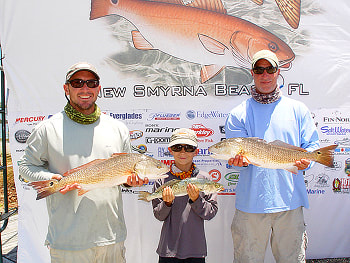|
To most inshore fishermen today that would seem to be a very odd question. BUT, not so very many years ago, it was a reality!
Red drum have been a popularly targeted fish for over a century. Although not officially designated as a protected “game fish” until the 1980s, catching redfish has been a hot ticket item for a very long time. Unfortunately, they were really easy to catch in the bays and estuaries of the coastal regions of the US and most of those caught were of the 1-2 year old stock which began to decimate the offshore breeding populations by a significant degree. This decimation of the inshore juveniles led to fewer offshore “breeder” fish which, in conjunction with an offshore commercial frenzy of netting the huge schools of adults, led to a massive decline in the population. Obviously, this decline of population led to great concern among anglers and to an increasingly sophisticated study of the redfish life cycle. Interruption points were defined, methods to increase numbers of breeders were more clearly stated, and angler education programs were instituted. Slowly, one by one, over the next 20 years, rules and laws were enacted by the coastal states to preserve that life cycle as much as possible. The result? We now have a very vigorous red drum fishery numbering higher than ever before historically documented. And I, for one, am very grateful to the marine biologists and environmentalists that brought the plight of the redfish to the forefront of conservation efforts. These efforts now extend throughout the coastal states and include massive education programs that inform the fishing public of the “whys” that the regulations are in place. This has led to a greater conformity by an educated recreational angler population that ensures the safety and continued propagation of the red drum for generations to come. The formation of coordinated redfish competitions has served to further popularize this incredible game fish and to further the catch and release philosophy that is so important in maintaining the redfish population. As the popularity of competitive redfishing has grown so has the intensity of the competition. Beginning about 15 years ago, redfishing as a competitive sport began to gain some real traction. Over the ensuing 10 years several organizations would spring up around this competitive frenzy. Most of them were doomed to a short life span due to poor management plans and agendas that were often in conflict with the anglers that were the very lifeblood of the sport. But, over time, a few would emerge that survived the fiery crucible that was to become the birthplace of competitive redfish tours and trails. And while we are all out there searching for, and finding, those lovely reds that we know so well, don’t forget to offer up a silent thank you to the legions of concerned anglers, biologists, and legislators that have helped us to have this incredible resource in our lifetimes. Also, don’t forget that it is our duty (and should be our passion) to promote the protection of our favorite species of game fish by educating our clients and the general fishing public with our words, our actions, and most importantly, with our deeds. Contact [email protected]
0 Comments
Your comment will be posted after it is approved.
Leave a Reply. |

 RSS Feed
RSS Feed
